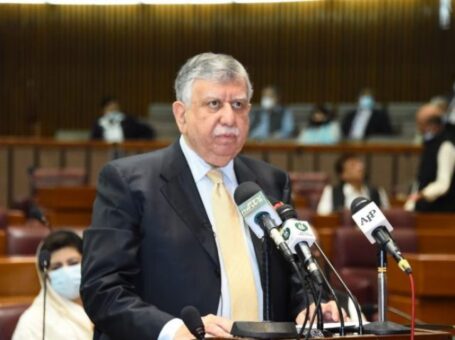KARACHI: Karachi Chamber of Commerce and Industry (KCCI) has criticized the decision to restore powers of Inland Revenue (IR) officers to recover due and taxes through bank account attachment without prior information.
(more…)Category: Trade & Industry
This section covers news on trade and industry. Pakistan Revenue is committed to providing the latest updates on business trends.
-

Business community mourns Abdul Qadeer’s demise
KARACHI: Pakistan’s business community has mourned the demise of Dr. Abdul Qadeer Khan, who was legendary scientist and father of Pakistan’s nuclear program.
Mian Nasser Hyatt Maggo, President of Federation of Pakistan Chambers of Commerce and Industry (FPCCI), in a statement said that the entire business, industry and trade community of Pakistan is mourning the demise of the legendary and celebrated scientist and father of Pakistan’s nuclear programme Dr. Abdul Qadeer Khan.
FPCCI Chief added that Dr. AQ Khan lived an accomplished life and lived the dream of Pakistan to the fullest. He inspired and motivated three generations of Pakistanis and will continue to inspire and influence the future generations to come.
Mian Nasser Hyatt Maggo said that the nuclear programme of Pakistan has effectively made the country’s defense invincible from external threats and has provided a secure environment for socio-economic growth of Pakistan.
FPCCI will hold Fateha Khawani in all its office countrywide for the departed soul and to commemorate Dr. AQ Khan’s unparalleled contributions to country’s defense, academia and philanthropic landscape.
-

FPCCI expresses annoyance over gas suspension
KARACHI: Federation of Pakistan Chambers of Commerce and Industry (FPCCI) has expressed annoyance over suspension in gas supply to industrial sector.
Mian Nasser Hyatt Maggo, President FPCCI, in a statement on Friday expressed his profound concerns over yet another gas supply suspension for 72 hours for the industrial areas of Sindh and Balochistan.
It will bring many export-oriented industrial units to a halt and ensuing losses, he added.
FPCCI Chief pointed out that after every few months the industrial sector has to endure the prolonged gas supply suspensions; despite repeated promises and assurances given to the business, industrial and trade community of Pakistan from the platform of FPCCI.
Mian Nasser Hyatt Maggo maintained that governments all over the world protect the industries from unplanned gas and fuel outages; and, also help them ward off the adverse effects, if the suspensions occur.
FPCCI President forewarned the government authorities that during winters there could be an unprecedented gas shortage and the country’s exports can be gravely impacted; and, the government should sit down with the business community at the earliest to chalk out a plan to protect the export-oriented industries from inevitable gas shortages.
Mian Nasser Hyatt Maggo, as President FPCCI, has reiterated his full support to facilitate consultative process between government authorities and the business community before the winter starts. FPCCI wants to support the government’s vision to enhance Pakistan’s exports in a fast-paced; yet, sustainable manner, he added.
-

NKATI condemns artificial raw material shortage
KARACHI: Manufacturers and exporters have expressed concerns over the severe shortage of industrial raw material that was artificially created by local producers.
In a statement on Thursday President, North Karachi Association of Trade and Industry (NKATI), Faisal Moiz Khan, while expressing deep concern over the artificial scarcity created by local producers of industrial raw materials and the skyrocketing prices, has appealed Abdul Razak Dawood, Advisor to Prime Minister Imran Khan for Commerce and Investment to take action against stockists of raw materials.
He requested the PM advisor to also play his vital role in ensuring an uninterrupted supply of raw materials at reasonable prices as per the demand of local and export-oriented industries.
In a letter to PM advisor, Abdul Razak Dawood, NKATI president pointed out that local producers of industrial raw materials have created an artificial shortage of raw materials by forming cartels, and by massive hoarding, prices have skyrocketed. Which has increased 300 to 400 times, making raw materials unavailable to local industries as per the demand, while the production activities of export-oriented industries were also being severely affected.
He said, “Local producers of industrial raw materials were making huge profits by selling expensive raw materials justifying the rising value of the dollar, which was totally illegal. The government should take immediate notice of this looting and take steps to prevent stockpiling of raw materials.”
Faisal Moiz Khan was of the opinion that the processing industry, especially the chemical industry, was facing the biggest shortage of raw materials, which was hurting the export industries. If the goods cannot be processed, then timely shipment will not be possible. This will definitely lead to an economic crisis in the country.
“The Prices have been increased 300 to 400 times, especially for Formic acid, Acetic acid and Sulfuric acid. Caustic Soda has also become a major problem, as Hydrogen prices have also been increased. The entire wreckage of which is being dumped on the international market. It has not been settled but the prices have been increased many times by including duty and freight etc.”, he said, adding that if the government did not intervene immediately and support exporters, the industrialists would suffer.
Faisal Moiz Khan appealed to Abdul Razak Dawood, Advisor to Prime Minister Imran Khan for Commerce & Investment to break the cartel of local producers of industrial raw materials, and said that the problems of Karachi industrialists should be seriously addressed as industrialists are playing their vital role in Pakistan’s economic development. Therefore, the rulers have to understand the importance of industrialists.
-

Saqib Naseem elected central chairman PYMA
KARACHI: Saqib Naseem has been elected unopposed central chairman of Pakistan Yarn Merchants Association (PYMA) while Javed Asghar elected senior vice chairman for the year 2021-22.
(more…) -

KCCI expresses grief over human loss in earthquake
KARACHI: Karachi Chamber of Commerce and Industry (KCCI) on Thursday expressed deep grief and sorrows over loss of human lives in earthquake, which jolted the Baluchistan province last night.
In a joint statement issued, Chairman Businessmen Group and Former President KCCI Zubair Motiwala, Vice Chairmen BMG Tahir Khaliq, Haroon Farooki, Anjum Nisar and Javed Bilwani, General Secretary BMG AQ Khalil, President KCCI Muhammad Idrees, Senior Vice President KCCI Abdul Rehman Naqi and Vice President KCCI Qazi Zahid Hussain noted that 20 people have fallen prey to the earthquake in Baluchistan and more than 300 people including women and kids have been injured whereas hundreds of houses were also damaged in various areas including Quetta, Sibbi, Pishin, Muslim Bagh, Ziarat, Qila Abdullah, Sanjavi, Zhob and Chaman.
They said that our brother and sisters, particularly those inhabiting in far-flung and impoverished areas of Baluchistan province, should not be left alone in this hour of grief and need. It is the duty of everyone to help and support the affectees during the most difficult time of their lives.
BMG leadership and KCCI Office Bearers, while appreciating the quick response of the government and armed forces, said that the government and the military forces were doing a fine job by promptly undertaking rescue operation and immediately dispatching relief goods and medical teams to the quake-hit areas of Baluchistan.
BMG leadership and KCCI Office Bearers, while praying for the wellbeing of people affected by the natural disaster as well as their recovery from the trauma and pain, offered heartfelt condolences to those families who lost their loved ones in this tragic incident.
They also appealed the fellow businessmen and industrialists to donate generously in whatever way they can for supporting the affectees of Baluchistan earthquake.
-

POS installation offers reduced tax rates: LTO Karachi
KARACHI: Officials of Large Taxpayers Office (LTO) Karachi have apprised the business community that installation of Point of Sale (POS) offered reduced rate of sales tax.
A team of tax officials from Large Tax Office (LTO) Karachi visited Pakistan Business Council (PBC) on Wednesday to discuss the integration of Tier-1 retailers, a statement said on Wednesday.
The purpose of the visit was to listen and redress the grievances regarding the online integration of Tier-1 retailers / Point of Sale (POS) with the FBR system.
It was apprised to the members that the POS integration of retailers does not involve new tax, rather it gives the benefit of reduced rate of sales tax to consumers who buy the goods from integrated Tier-1 retailers.
The LTO Karachi team was comprised of officers included: Shakeel Ahmad Kasana, Commissioner-Inland Revenue (IR); Aijaz Hussain, Additional Commissioner-IR; Shoukat Ali Changezi, Additional Commissioner-IR; Abdul Hameed Mangrio Deputy Commissioner-IR; and Amjad Ali Moroojo, Audit Officer-IR.
The representatives of the PBC were: Ehsan A. Malik, Chief Executive; Samir S. Amir, Director Research; and Aman Chanchi, Unilever Pakistan.
The Commissioner-IR briefed the members regarding the scope and purpose of POS integration.
A formal presentation was given by Abdul Hameed Mangrio, Deputy Commissioner which was followed by Q&A session.
The delegation requested the members to encourage the Tier-1 retailers to get integrated with the FBR system for ease of reporting of sales and avoid unnecessary documentation besides enjoying reduced rates of tax on their supplies.
The members of the Council appreciated the outreach efforts of FBR to remove the misconception and misgivings regarding the online integration of retailers with the FBR system.
They appreciated the system and informed that Pakistan Business Council is always encouraged to promote documentation of the economy and Point of Sale (POS) is the right step in this direction.
They also assured their active engagement for making the Point of Sale (POS) integration a success story for the larger interest of the country and the documentation of the economy.
-

“FBR not to take action directly against non-filers”
KARACHI: The Federal Board of Revenue (FBR) will not take any action directly against non-filers or under-filers, Finance Minister Shaukat Tarin assured the members of Karachi Chamber of Commerce and Industry (KCCI).
A statement issued by the KCCI stated that Finance Minister Shaukat Tarin had assured to review the matter of filers and non-filers and look into the possibility of re-examining the term ‘non-filer’ and ‘under-filer’ in consultation with stakeholders whereas in the meantime, “no one will suffer as FBR will not take the action directly.”
FBR will share relevant data with Chambers and also upload the same on its website.
The government intends to take help of artificial intelligence and assessment will be done through third party while appropriate time of 90 days will be provided to non-taxpayers for settlement, the Finance Minister added while speaking at a meeting with a delegation KCCI.
Federal Minister for Energy Hammad Azhar, Advisor to PM on Commerce Abdul Razak Dawood, Chairman Federal Board of Revenue Ashfaq Ahmed and other senior officials of Finance Ministry and FBR also accompanied Shaukat Tarin at the meeting while KCCI’s delegation, which was led by Chairman Businessmen Group & Former President KCCI Zubair Motiwala, comprised of Vice Chairmen BMG Haroon Farooki & Jawed Bilwani, General Secretary BMG AQ Khalil and President KCCI Muhammad Idrees.
Referring to Chairman BMG’s remarks about discrimination with export-oriented industries of Sindh with regards to supply of RLNG at $6.5 per MMBTU, Energy Minister Hammad Azhar agreed to supply RLNG at $6.5 per MMBTU to export-oriented industries of Sindh. In this regard, the Ministry of Finance will sanction subsidy and relevant notification will also be issued.
Hammad Azhar stated that the Ministry of Energy will also convene a meeting to discuss KCCI’s concerns over gas crises in winter season so that they could explore ways and means for smooth supply of gas to industries/ consumers of SSGCL in winter season. MD SSGC will also be advised to hold a meeting with KCCI in this regard, he added.
On the occasion, PM’s Advisor Abdul Razak Dawood said that they were considering waiver of duty on import of cotton yarn. It was also concurred that KCCI’s proposal to reduce concessional rate of 0.1 percent to 0.01 percent on Traders/ brokers of Cotton Yarn under SRO.333 (I) 2001 dated 02.05.2011 has been taken into consideration in the larger interest of value-added exports.
Razak Dawood, while appreciating KCCI’s idea of giving Industry status to “Warehousing / Cold Chain / Cold Storage”, said that the government will look into this matter.
He reiterated that Drawback on Local Taxes & Levies (DLTL) will either continue with same rate or the government may increase the rate of drawback whereas the old income tax claims will also be refunded at the earliest.
Speaking on the occasion, Chairman Federal Board of Revenue (FBR) Dr Ashfaq Ahmed assured that the Government will review the matter pertaining to CNIC requirement and 3 percent tax which KCCI believes should not be mandatory but optional as 3 percent tax on sales to unregistered persons was already being collected hence there was no need for demanding CNIC. He also promised to hold a meeting within next week via zoom facility to discuss the progress on various taxation issues.
In response to problems being faced because of the condition to put invoice and packing list inside imported container or consignment, the lawmakers assured to review KCCI’s proposal that the bank should only receive document when invoice and packing list is attached with the documents and consignment should be released with the provision of invoice and packing list from Customs.
It was also assured that the government will also look into KCCI’s proposals to amend provision under S. No.4 in which a new section 114B has been inserted in Income Tax Ordinance 2001, providing discretionary powers to FBR to issue General Orders to disable mobile phones/SIMS, disconnect electricity and gas connection etc. to enforce filing of returns by the persons not appearing on the ATL. The Karachi Chamber, in this regard, has proposed the provision may be amended to substitute the words “Persons not appearing on ATL” with “Unregistered Persons” to achieve the purpose of broadening of tax-base.
KCCI delegation, while conveying gratitude to Finance Minister for fulfilling his commitment of holding today’s meeting in Islamabad along with Hammad Azhar, Razak Dawood and others, expressed confidence over the stewardship and seriousness being exhibited by Shaukat Tarin towards resolving the problems being suffered by the business and industrial community.
Finance Minister, in his concluding remarks, said that he will keep on visiting KCCI after every three months while Chairman FBR will also be visiting the Chamber on a monthly basis.
-

Return filing date extended for 15 days
KARACHI: The last date for filing income tax returns has been extended for 15 days till October 15, 2021 from September 30, 2021.
Finance Minister Shaukat Tarin on Thursday announced to extend the date after listening to the problems being faced by taxpayers in filing income tax returns, which were highlighted by a delegation of Karachi Chamber of Commerce & Industry (KCCI) at a meeting held in Islamabad on Thursday.
KCCI delegation, which was led by Chairman Businessmen Group & Former President KCCI Zubair Motiwala, comprised of Vice Chairman BMG Haroon Farooki & Jawed Bilwani, General Secretary BMG AQ Khalil and President KCCI Muhammad Idrees who appreciated the finance minister for understanding the hardships being faced by taxpayers in filing income tax return and accordingly announcing relief.
The delegation members, while underscoring the need to modify the ineffective taxation policies, expressed deep concerns over the implementation of Tax Laws (Third Amendment) Ordinance 2021 which, they feared, would start from Karachi as it has been observed from time to time that all such laws carrying penalties always start from Karachi and stay confined mostly to this city only.
If Karachi has to pay all the taxes and suffer penalties as well then why Karachi was not receiving development funds in proportion to its contribution, they asked and reiterated KCCI’s demand to replace term ‘under-filers’ in the controversial ordinance with ‘non-filers’.
-

FPCCI demands tax return filing date extension
KARACHI: Federation of Pakistan Chambers of Commerce and Industry (FPCCI) on Tuesday demanded the tax authorities of extending the return filing date at least for two months.
In a statement, FPCCI President Mian Nasser Hyatt Maggo, demanded the Federal Board of Revenue (FBR) to extend the deadline for tax filing by two months to facilitate the business community and support the government’s drive to broaden the tax base and collect maximum taxes.
FPCCI Chief, referring to the fast-approaching deadline of September 30, 2021, i.e. Thursday; and, recommended to the authorities that on the basis of feedback from businesses across Pakistan, FPCCI maintains that hundreds of thousands of SME owners will not be able to file their income taxes by Thursday.
Mian Nasser Hyatt Maggo said that FBR has notified a daily surcharge of 0.1 per cent for delayed filing on taxable income; which is not only harsh but also impractical as it translates into 3 per cent per month and 36 per cent per annum.
The maximum surcharge by FBR should not be more than KIBOR plus 2 per cent; which also happens to be the rate when FBR delays the processing of tax refunds.
Mian Nasser Hyatt Maggo, as President FPCCI, has reiterated his stance that FBR should stop taking one-sided radical anti-business decisions; instead, should have a detailed consultative process with the business, industry and trade community of Pakistan and FPCCI is ever-ready to provide its platform as their apex representative body.